| | - 10 July 1998
- Not Parallel
(sketch) - Not Parallel (sketch) is rather a straightforward idea: weights hang by wires from the characters in "NOT PARALLEL." Since gravity will attract the weights to the center of the Earth (I think), the lines won't be parallel (I think).
Not Parallel (sketch) is available in the PDF format; review the technical notes if you're unfamiliar with these things.  - 11 July 1998
- Amazing and Disturbing
- It sometimes seems that Kate describes most things that capture her attention as either "amazing" or "disturbing." That's amazing, and disturbing as well.
 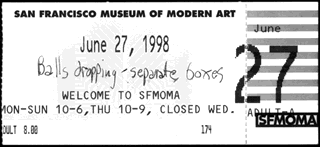
- 12 July 1998
- Plagiarism With a Good Provenance
- I just found a note I'd written on my SFMoMA admission ticket: "Balls dropping--separate boxes." (I rarely use a pen these days, but the electronic doodad that translates my handwriting into text was unavailable.) Plagiarizing both Joseph Cornell and Robert Cumming in the same piece has some merit, but it's hard to tell now: seeing the idea on a Museum of Modern [sic] Art receipt adds all sorts of undesirable connotations.
 - 13 July 1998
- Twittish Airways
- I think Mrs. Gc'ose Ntcox'o spoke for many other artists when she said, "I may be illiterate but I'm not stupid." Mrs. Gc'ose Ntcox'o's work appears on British Airways planes; The World's Least Favourite [sic] Airline paid a relative pittance to obtain the copyright to her painting. I suppose that's what she gets for living in Botswana instead of the United [sic] Queendom [sic].
Mrs. Gc'ose Ntcox'o isn't getting much sympathy. A Twittish Airways (as the carrier was described in that august periodical, The Sun) spokesperson said "She got a fair deal." And she fared even worse by the Kuru Development Trust, the agency that marketed the original painting ... and got half of the 3,800 pounds Twittish Airways paid Mrs. Gc'ose Ntcox'o. Kuru Development Trust spokesperson Rein Dekkar said "The artist is illiterate. She is happy. She has no need for money." I wonder if Mr. Dekkar is on his way to or from the Arts Council of England?  - 14 July 1998
- A Definitive Dedication
- Charles Wehrenberg has a great dedication in his book Radio-Reactive: "for everyone who has ever written me a check." I'd like to plagiarize it, except nothing I've written is good enough to follow such a wonderful beginning.
 - 15 July 1998
- Marty's Ego Control Strategy
- Marty writes letters to the editors of small newspapers just to see her name in print. She says that the modest public recognition she receives from writing three-paragraph letters about the postal service, the price of lettuce, ozone depletion, Albanian orphans, et cetera, allows her to comfortably pursue her serious work in anonymity and obscurity.
I'm not sure about Marty's strategy for ego control. On one hand it seems a bit silly, but, on the other, it's appreciably better than my approach.  - 16 July 1998
- Mythomania
- Susie told me I "wasn't bad for a mythomaniac."
I protested; my dictionary defines mythomania as "lying or exaggerating to an abnormal degree." Susie protested my protestations. "My dictionary defines mythomania as 'a compulsion to embroider the truth, engage in exaggeration, or tell lies.' " I wasn't mollified. (Being defensive is one of my worst traits.) "It still sounds like you're calling me a lair." "Don't take it so personally, David," she said consolingly, "I'm a mythomaniac too."  - 17 July 1998
- Misplaced Technical Considerations
- I was, as usual, having technical problems with the technical bits of my Internet endeavors, so one of my mentors stepped in to help. I told him what the problem was, and he typed in a hundred characters in this program, a couple hundred more in that program, and a hundred more characters in a third program.
"Now what?" I asked. "Now everything will happen automagically." Aha! I now see where I went wrong: too much emphasis on technique and too little attention to magic.  - 18 July 1998
- Dematuring
- Sam claims he's "a fully matured adult." Sam is, in fact, a cretin. I used to be mature too, but I got over it. The more I demature the better I get.
 - 19 July 1998
- A Scientist and a Poet
- Katia and Jamie are having a long argument; Jamie started it when she asked Katia which weighed more: a kilogram of feathers or a kilogram of iron?
"A kilo of iron, of course," said Katia. "Of course not," replied Jamie. "A kilo of anything weighs the same as a kilo anything else." "Actually, lead wants to be in the center of the planet and feathers want to be in the atmosphere, so of course the kilo of lead is going to put more pressure on the scale than a kilo of feathers." I was tempted to ask "Who cares?" but I learned long ago not to get involved in disputes between scientists and poets.  - 20 July 1998
- The Faceless Volunteer
- Alex Horton wrote to tell me he was compiling a book of "funny-but-true Greenpeace stories." It sounded like a good idea until he mentioned he was doing so "with the aim to entertain and educate at the same time." Big mistake, Al!
I told him I couldn't help him, since most of my pleasant Greenpeace memories involve drug and alcohol abuse, improbable sex, and libelous anecdotes, such as the one about Peter Wilcox, the Rainbow Warrior captain, chugging on a bottle of rum and explaining, "Hell, any fool can drive a ship when he's sober." Even though I knew I was wasting my time, I told Alex about Jet Johnson, as well as the previously unpublished story about ... The Faceless Volunteer On the morning after Halloween in 1977, a corpse floated past the Greenpeace ship Ohana Kai where it was docked between Pier 31 and Pier 33 in San Francisco. Frog (who earned his the name by virtue of a tattoo on his genitals) first called attention to the visitor by noting, "There's a scarecrow from last night." The scarecrow was, as previously mentioned, a corpse. The corpse had no shoes, no toes, and no face. Its flesh rippled with the currents. Soon, the whole crew--many of whom were newly media conscious--was on deck. The late Dexter Cate, not one to ignore an opportunity, grabbed a bag of "Save the Whales" buttons and began to drop them on the corpse's chest. Only after a number of the buttons bounced off did one finally remain on the corpse's shirt. (I don't think the image made the evening news, though. Nice try, Dexter!) Nancy Foote was in the process of putting several rolls of film through her camera when The Authorities arrived. The coroner, after poking the dead man's chest, pronounced, "Yep, that's the real McCoy." Meanwhile, a jurisdictional dispute developed when no one wanted to deal with the faceless volunteer. The U.S. Coast Guard pushed the man under the dock. The San Francisco Fire Department workers, not wanting the man in their territory, responded by pushing the corpse back into Coast Guard waters. And so on. Finally, the game of dead man shuffleboard ended when the Coasties grabbed the man and put him into a plastic bag. End of story. A lighter shade of green indeed. 
- 21 July 1998
- An Unnecessary Trademark Claim
- I saw an ad featuring a photograph of Miles Davis; the image was made by Jim Marshall™. Jim Marshall™? I've known Jim for years, and I've never confused him with anyone else, nor have I ever mistaken his work with anyone else's. For better (his work) or worse (his calculatedly offensive behavior), Jim's done more than enough to establish his identity and obviate the need for the silly "™" after his name. The move seems especially ill-advised for a fine photographer, since the only person I've seen use this tactic is the mediocre musician John Cougar Mellencamp™.
(As a friend of Jim's, I feel the need to expand on the remark about "his calculatedly offensive behavior." Jim's one of the kindest, most generous and thoughtful people I know. And, when it comes to photography, one of the most dedicated and hard working as well. That was not at all apparent to me during our first meetings, when he was abusive, insulting, and generally unpleasant. And that's as far as many people get with him, which is too bad for all concerned. Jim reminds me of the father of The Brothers Karamazov. (I could be easily mistaken, though, since it's been years since I've read anything by Fyodor Mikhaylovich Dostoyevsky.) The father tries to antagonize people by his behavior, which he uses as a filter: anyone who can't see through his act isn't worth bothering with. I've employed the technique myself on occasion with decidedly mixed results.)  
- 22 July 1998
- Carrits
- I bought some "carrits" from a street vendor selling overpriced vegetables. When I told him he'd misspelled "carrits," he said it was "an intentional marketing move."
"A marketing move?" "That's right, mate. Me an' the lads at LSE were taught people think they get better deals from us 'simple country folk,' so we try to look as quaint and backward as possible. Smart move, innit?" Smart people take advantage of not quite as smart people; it happens to me all the time.  - 23 July 1998
- A Big White Something
- Lillian was describing the view from her apartment.
"Sometimes I can see the moon over the hill; it look just like a big white ... [long thoughtful pause] ... a big white something." 
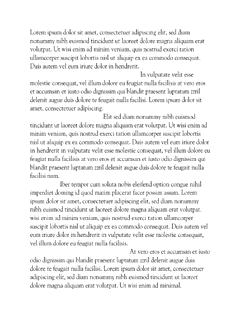
- 24 July 1998
- Clever Typography
- I see typography almost every day of the year, so it came as quite a surprise to discover an approach I'd never come across before. The unnamed designer indented each paragraph the distance of the line above it. It was so clever I couldn't tell whether or not I liked it.
 
- 25 July 1998
- Zone Ends
- An update, a clarification of two distinctions, and an apology of sorts, not necessarily in that order:
Oh dear. It seems my childish whining about not being reimbursed for production expenses may have offended one or more of the two friends previously employed by Zone Gallery. But before I go into that; I need to explain why they're "previously employed." There are a disturbingly large number of arts administraitors in Northern England who demonstrate their commitment to artistic excellence in a manner most perverse. Once upon a time--the late 1980s and early 1990s, actually--there was a Newcastle-based arts organization called Projects UK. The staff there did some good and interesting work. Until ... As I understand it, some parasitic arts business consultants recommended that Projects UK be shut down and its functions relegated to a new yet-to-be-created arts organization that would do everything Projects UK did and more. Better. Bigger better: that's the ticket! The administraitors dutifully shut down Projects UK, then somehow never got around to building the new organization. What a surprise! It seems that one or more of the Zone Gallery trustees [sic] decided that Zone Gallery should reach a new pinnacle of artistic excellence using the Projects UK approach. Although Mark Little, the chair of Zone's trustees [sic] , recently wrote to me that, "I must stress that at no time did the Board of Trustees [sic] assume the management of the organisation," some mysterious entity fired David Sinden and Michelle Hirshhorn, the two staffers who made Zone an interesting venue. After shutting down Zone Gallery, no new entity was created by the board of Little vision. What a surprise! And I'm still waiting for my Foundations, Fountains, Filters and $ome $eriou$ Mone¥ expenses to be reimbursed. (I think it's important to emphasize that my recent administrative nightmares with the dead Zone's administraitors are exactly the opposite of my experiences with David and Michelle, who were both relentlessly competent and occasionally brilliant. They set out to do ambitious projects then did them, behavior that markedly distinguishes them from the administraitors who, to use the relevant weasel words, "let them go.")  - 26 July 1998
- The Five to Six Hour
- Sandy Nairn from London's Tate Gallery gave a wonderful insight into contemporary arts institutions when he described "the five to six hour." He said at the end of every day he became used to hearing the sound of buzzers telling visitors it was time to leave. At the same time, he became gradually aware of the smell of canapés being prepared for the evening's corporate and private events.
His story provided an interesting contrast in Pavlovian responses: when he smells canapés I suppose he smells his next pay check, maybe even a bonus. When I smell canapés, I smell another free dinner, usually accompanied by cheap white (no stains when it's spilled) wine. I suppose that's yet another difference between artists and curators.  - 27 July 1998
- Destiny on Hold
- "Dr. Rinehart, it's destiny calling for you on line four."
"Say I'm out to lunch," I told my acting amanuensis. Destiny's kind of like god(s): I don't really believe in it(them), but I can't dismiss it(them) with confidence, either. Just be on the safe side, I left for a very early lunch.  - 28 July 1998
- Aaron's Business Strategy
- Aaron only employs gruntled workers; he says it's good for business.
 - 29 July 1998
- Nocturnal Problems
- I couldn't sleep last night after at least two travel anxiety dreams--I forgot my passport and discovered it was almost illegible after having been washed; the train I stole went off the tracks and down a street where it was hijacked by a(nother) psychopath who eventually took the train to the airport ... that sort of thing. Wide awake, I couldn't go back to sleep until I spent what seemed like an hour imagining I was sleeping on a bed of marshmallows. And even that didn't work: I woke up with sugar-sticky hands. The rest of the day promises further misery.
(Later there were minor peanut butter burns.)  - 30 July 1998
- Pope's Practical Perspective
- We were drinking the other night and trying to remember who said:
"O, what a tangled web we weave,
When first we practice to deceive!" We all agreed it had to be Wise Willy Shakespeare and we were all wrong: it was penned by (or at least credited to) Walter Scott. During the course of looking up the quote, I came across J. R. Pope's rejoinder in A Word of Encouragement: "But when we've practised quite a while
How vastly we improve our style." Practice makes perfect. (I wonder who said that?)  - 31 July 1998
- Virtual Reykjavik
- Frank Muir died recently, a final career move that has predictably generated a lot of interest in his work. I listened to one of his long monologues in which he described his first forays into broadcasting during World War II. (As a photographer, he had a lot of time on his hands: first being assigned to a base in England with lots of heavy aerial cameras and no planes, and, then, to a base in Iceland with lots of planes but no cameras.) He implied that he developed his art--and his confidence--by testing out different radio broadcast approaches in the relative anonymity of the North Atlantic: "Reykjavik was a place to be bad in."
In some, perhaps many, respects, the Internet is the middle of the North Atlantic.  - 1 August 1998
- Deadlines
- Half of the people alive today have never used a telephone. Ever. And no dead person has ever used a telephone. Ever.
If even one dead person ever phoned, love, art--everything, really--would be somewhat different.  - 2 August 1998
- The Hairy Naked Russian Poets
- The Institute of Contemporary Arts in London is holding the First International Festival of Naked Poetry. The event will, however, be staged without the participation of The Poetry Society.
Poetry Society director Chris Meade said he turned down a sponsorship request from "two hairy Russian poets." The Russian poets in question are Vladimir Yaremenko and Tim Gadanski, whose readings were greeted with torrents of tomatoes, abuse and eggs from St. Petersburg audiences before they hit on the strategy of calling themselves The Naked Russian Poets and performing nude. As Gadanski put it, "Clothes, like chains, must be thrown away and poets become free and powerful." The newspaper article I read did not indicate whether The Naked Russian Poets will be at the First International Festival of Naked Poetry. I think I got the gist of the marketing plan, though, with the photograph accompanying the piece: it was an image of two not unattractive nude young women holding volumes of prose. Given the state of contemporary marketing, I don't see much of a future for The Naked Russian Poets, at least the hirsute ones.  
- 3 August 1998
- Cheap Readymades
- I was alarmed to see that a local shop is selling Readymades at half the usual price. I fear the bottom may be dropping out of the conceptual art market.
 - 4 August 1998
- Of Age in 2002
- Oh dear, it's another moral outrage. There's a fourteen year old actress starring in the new Lolita film, and some people are predictably outraged. I'm not sure what to think. On one hand, a film is only a film featuring actors acting. On the other hand, anything to do with pedophiles is thoroughly repulsive. I suppose I'll compromise and wait until 2002 to see Lolita. By then, the actress will be eighteen, and thus "of age."
 - 5 August 1998
- One Point Six Percent Human
- I just read that we humans share 98.4 percent of our DNA with pygmy chimpanzees. The inescapable conclusion is that we--you and I--are only 1.6 percent human. I wonder which bits?
 - 6 August 1998
- Seven Up Stains
- It's all you can hear on the "news" reports these days: the president of the United States is in trouble, drinking trouble. It seems a former aid has evidence that he's been drinking seven up and has the stains on her dress to prove it.
This, of course, is a horrible breach of security. Seven up's effervescence is insufficient to distort sound waves, so speech is reflected off the surface of the glass onto window panes where sensitive laser surveillance can monitor sensitive conversations. That's why the secret service insists on serving specially formulated extra-fizzy coke at high government functions. (That's coke as in coca-cola, not cocaine, I think.) As for myself, I like to foil nefarious spies by drinking bourbon from a large glass. Not only do the thick fumes distort the sound waves of my voice; they also slur my nemeses' hearing.  - 7 August 1998
- Like Corkwork
- Even if I drank 10,000 bottles of wine, I doubt I'll ever understand how they get the cork in the bottle. But, then again, I'll never know unless I try: back to work!
 - 8 August 1998
- Nothing Means Nothing
-
 - 9 August 1998
- The Director's Choice
- The man sitting across the table from me on the train is reading the magazine Cleaning and Hygiene Today. He is making notes in the margins of the magazine for later reference. From his accent, formulaic corporate attire, and expensive watch, I assume he is a Scottish cleaning and hygiene executive, today.
His companion points out a photograph of an attractive woman in a skin-tight leather suit. "I can't believe they picked Uma Thurman to play Mrs. Peel in the Avengers movie! I can't imagine why they did that! She's not even English!" I don't find it difficult to understand the director's choice. Unlike Cleaning and Hygiene Today, breasts and buttocks almost sell themselves. The journey continues, uneventfully.  - 10 August 1998
- Years Before 0'00"
- Everybody who knows about these things knows about John Cage's piece 4'33". But few people have heard of Cage's 1962 piece 0'00" (4'33" No. 2) that he made ten years after the original. (I didn't know about it, ergo few people have heard of it.) Having twice plagiarized 4'33", it may be time to move on to 0'00" (4'33" No. 2) ... in a while. I think I too will use a decade interval between pieces.
I never met John Cage, although I could have. He came to Interlochen when I was a student there; as a callow teenager I thought he was just a crazy guy with an affinity for mushrooms. And now I'm just a crazy guy with an affinity for mushrooms.  - 11 August 1998
- When I Was Your Age
- At my age, I'm hypersensitive to the indicators of middle age, which are starting to appear with increasingly regularity: beginning sentences with, "When I was your age," measuring time in decades instead of years, that sort of thing.
Colleen said I worry too much about middle age, since "the next stage is worse." "What's the next stage?" "You know," she said, "old farthood." I was again struck by how insightful Colleen can sometimes be, even though she's a decade younger than me, maybe even two. I was never that clever when I was her age.  - 12 August 1998
- A Short Tale of Two Rauschenbergs
- I was disappointed in a book of Rauschenberg photographs I found in the library. I've always liked Chris Rauschenberg's photographs, but these turned out to be by his famous father, Robert. I think Robert Rauschenberg's fine as blue chip contemporary artists go, but the photographs in In + Out City Limits seemed academic and uninspired.
Too bad: too bad for Robert, and too bad for Chris. Robert's accomplishments in other media mean his photographs get published when perhaps they shouldn't, and Chris's photographs rarely get shown at all. I'm glad my parents were never famous.  - 13 August 1998
- Roverandom
- I was doing the dishes this morning and listening to the radio. There was an amazing story about winged dogs on the moon; it was great! Although I rarely read anything that's not recommended by a friend, I thought this story about the man in the moon and dogs and dragons was worth tracking down.
And then I discovered it was written by John Ronald Reuel Tolkien, the man involuntary responsible for lots of horrific Led Zeppelin lyrics and all manner of teenage excess. It's so uncool to like something by an uncool author. But given that I'm uncool, an uncool author, and too old to worry about it, I'm going to read about dogs flying around the moon. Arf!  - 14 August 1998
- Commercial Waste Is My Destiny
- Judging from the press accounts I read, Maggie Dodds didn't have much of a life. She spent the last fifty-seven of her eighty-five years in a variety of hospitals, nursing homes, and other facilities for warehousing breathing humans. When she stopped breathing, she had the bad fortune to do so in Morpeth, England.
The Castle Morpeth Borough Council decided not to fund a pauper's funeral for the old woman with no known relatives because she died in a private nursing home. "Ergo," the bureaucrats reasoned, "from a purely commercial view, deceased residents may then be regarded as being the waste produced by their business." It's a reassuring thought to know with certainty what will become of me when I'm dead. I, like poor Maggie, will be commercial waste.  - 15 August 1998
- Art, What It Is
- Some people are going on and on debating what art is. Why they bother I do not know. Everybody knows what art is; it's the second person singular present indicative of "be."
 - 16 August 1998
- An Excipient with a K
- I went to buy a can of beer at the train station; it's always cheaper than buying it on the train. I didn't see any of the beers I usually drink, but I did notice a large handsome black can with a red K on it. K for kablooey? K for killer? K for kaput? I wasn't interested in semantics or symbolism. The real attraction was the unambiguous "8.4 percent alcohol."
I got on the train, found a seat, opened the can, and got a surprise. My can of beer was actually a can of cider. I remarked on this to the man beside me with two large cans of beer on his tray. "What you have there, my friend, is neither beer nor cider. W,hat you have there is an excipient." "Good point," I replied. I had no idea what he was talking about. After he passed out around Berwick-upon-Tweed, I looked up excipient in my dictionary. I discovered that an excipient is "an inert substance used as a diluent or vehicle for a drug." So, whisky, beer, and wine are excipients for alcohol, and coffee is an excipient for caffeine. I wonder if artmaking is an excipient for aesthetics? Is sex an excipient for love? Is love an excipient for sex? It's hard to think after half a liter of industrial-strength cider.  - 17 August 1998
- Alien Transmission No. Two
- I'd pretty much forgotten becoming an alien since it happened on 9 June. People think becoming an alien means all sorts of crazy things; people watch too much television. Here's what it's really like to become an alien: it's like getting gray hair or eating caterpillars. I'm different but I'm more or less the same.
At first I worried that I might get into trouble for writing about my experience on the jet, but I stopped thinking about it after a while. In fact I almost forgot about it until today when I ran into Phillip in a bar. He was the first alien I'd seen since I became one over the North Atlantic sixty-nine days ago. I didn't know what to say to Phillip, so I asked him if we had any business to take care of. "Business?" he asked. "What are you talking about?" I told him that I thought there might have been some, well, repercussions from revealing that I was an alien. Phillip's answer surprised me: "Why should we care what you humans do?" "But I'm one of you," I protested. "I mean I'm one of us." (Grammar doesn't get any better or easier after the change.) "You worry too much," Phillip sighed. I told Phillip I could use some guidelines to help avoid any alien faux pas. "OK," said Phillip. "You want advice, here's advice: when you're in a bar, drink."  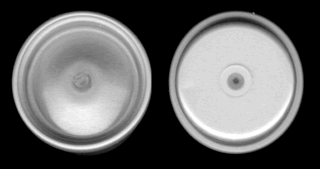
- 18 August 1998
- Drinking for the Environment
- Lots of high tech beer cans feature compressed gas that escapes from a pressurized plastic container inside the can.
Phhht! Murphy's Irish Stout employs similar technology, but, instead of using plastic inside the can, the brewers use a recyclable floating "Draughtflow" insert. Unlike the plastic thingies, this one's aluminum (perhaps) and thus recyclable, mostly (probably). Phhhht! Phhhht! The more you drink the better it is for the environment. That's something I always maintained during my Greenpeace days, and now science has proved it. Phhhhht! Phhhhht! Phhhhht!  - 19 August 1998
- A Dangerous Litterary Development
- I was in a book store today when I noticed a bizarre guarantee. The cover of a new publication promised that John Gilstrap's At All Costs is "as good as Richard North Patterson or your money back."
Whoa! This bizarre guarantee raises several questions. What if John Gilstrap is better than Richard North Patterson: do I pay extra? What if the book is read by several people in my household d'jour, some of whom prefer Richard North Patterson and some of whom favor John Gilstrap? Partial refund? Copyright infringement? I've never heard of John Gilstrap or Richard North Patterson, and I don't think that's going to change anytime soon. Running a book store like a casino may be a clever marketing move, but I don't think it bodes well for litterature.  - 20 August 1998
- So Old He's Hip
- A reporter described an aging dance hall in Barcelona where elderly men wore "suits so old they were hip." I like that idea: tenacity is eventually rewarded. If I persevere long enough I too may eventually become hip.
Or maybe not. I'm thinking of Ferenc Berko. Ferenc is a wonderful old photographer; he made all sorts of strong images much earlier in the century, the kind of work that led to others making the similar work at the same time to be called "some of the great photographers of the twentieth century." So why isn't Ferenc Berko generally regarded as one of the great photographers of the twentieth century? In a word, Aspen. Instead of staying in one of the hip European cities or New York--or even remaining at László Moholy-Nagy's Chicago Institute of Design--Ferenc moved to Aspen, Colorado. Aspen is a lovely trendy little skiing town some two hundred kilometers west of Denver and a trillion kilometers from anywhere. Living away from the people who write the history books has a lot to be said for it, unless you want to be included in their tomes. When I met Ferenc almost a decade ago, he'd decided in his seventies that he didn't want to be omitted from the canon of twentieth-century photography. I offered to help him put together a book dummy of his life's work, and, to my pleasant surprise, he accepted. He flew to San Francisco, and we spent a few days going through his life's work. We ended up with a nice prototype of a stillborn book. I last saw Ferenc seven years ago at the Rencontres Internationales de la Photographie in Arles; he had a good show there. I was happy for him. And now I must end on an embarrassing note: I don't know if Ferenc is still alive. Here's what I do know, though: Ferenc lived long enough to do some good work, work that survived long enough to be hip.  
- 21 August 1998
- The Battle Against Portion Control
- Portion control is a sign of the end of civilization as we know it. The local fish and chips shop has begun measuring chips--weighing common potatoes! It's increasingly improbable that a bartender will be able to pour a drink without it coming out of some sort of stingy measuring device. And now there's portion control in the home in the form of an innocuous yellow plastic template.
This piece of plastic has three holes: two portions, one portion, starter. If you're making pasta for two people you use as much as will fit through the largest hole. The medium aperture is the pasta-for-one hole, and the smallest opening is for pasta as a side dish. This is an annoying contraption for two reasons. First, it works. If you use common pasta, you end up with about the right amount. The second reason I hate this device is based on the first reason: I can no longer accidentally make way too much pasta, then proceed to eat it all on the premise that there isn't enough extra food to save for a second meal. I fear the battle against portion control is futile.  - 22 August 1998
- The Problem with Megastardom
- Richard Grant told me a great story at a party last night. (That's Richard E. Grant, the actor, as in Withnail, as in the film Withnail and I.) I can't retell the story, though, because I didn't really meet Richard E. Grant. Ever. I did, however, read a nice article about him in the Saturday newspaper.
I read that he keeps a notebook, which he publishes. And so people are always coming up to him at parties and feeding him stories and other things to write about. My life--or at least this notebook--would be a lot easier if I was known as a notebook writer; people would tell me things to write and I could think even less than I do now. If I had lots of money, I might even hire staff writers who'd write accounts of things that never happened to me, like Richard Grant telling me a great story at a party last night. Actually, I'm glad I'm not Richard Grant. He sounds both brilliant and hard-working, but at what price? I read he doesn't eat dairy products or drink alcohol. Although I sacrifice a little here and there for my art, I can't imagine giving up pizza and beer. But the worst aspect of being Richard Grant is being famous, and the worst part of being famous is being famous. As Grant observed, "I defy anybody not to have their head turned by megastardom because it is a completely abnormal existence. You live a life of extreme fantasy, you're wonderful, you're paid millions, everyone thinks you're beautiful, brilliant, everyone's gagging to hear your every word, capture your every expression, and then the next day you learn you're ugly, you speak all wrong, you're not talented after all, your last three movies were shit, and you're gone. It's so fast and ruthless." That's a rather long-winded version (but what else would one expect from a writer and an actor?) of Keith Richards' take on the situation: "Once you get famous this bloody fame shit can really get on your back."  - 23 August 1998
- A Barely Legible Complaint
- I ran across an interesting letter to the editor in an old copy of Wired magazine:
I have been reading Wired for five issues now, and in every one it seems that someone whines on about how the design interferes with the information in the magazine. To that I say that magazines have moved on and so have their readers. At that point this reader moved on. Although I thought the letter's author raised a good point, my eyes started to hurt from trying to read the tiny black type on a dark silver background. I guess I'll always be a peasant, and a whining one at that.  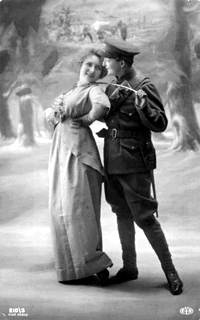
- 24 August 1998
- A Sovenier from Jim xxx
- I ran across a postcard in a shop; "A Sovenier from Jim xxx" appeared where you'd expect to find the recipient's name and address. Here's the text of the post card:
Dear E this is how we will look after we are married, Oh Love do not go to any Expense for New Clothes as this to Sudden any Old thing will do xxx
- It was dated "Aug 3rd/15." 1915! Eighty-three years ago! Are Jim and/or E still alive? If so, they're almost certainly over a hundred years old. I wonder, though, if Jim and E ever got married? Jim's fantasy of being in a military uniform doesn't bode well for his future in 1915. I wonder if he was one of those poor kids who died horrific muddy trench deaths at the whim of an incompetent commander.
On a positive note, Jim probably made it through World War Uno. His spelling's not very good; I'll bet he was an aristocrat who sat out the hostilities in an alcoholic befuddlement. With E, I hope. 
- 25 August 1998
- On the Merkin Trail
- I rarely get any response to my notebook entries, but two people suggested I may not have been hallucinating when I thought I saw a genital wig. First, I received a brief note from an American scholar.
I don't know what a genital wig is, but there is such a thing as a pubic wig. It is called a merkin.
- Today I received a more elaborate explanation.
Regarding your 12 June entry on Genital Wigs:
Yes, I have heard of such a thing. They are called "mirkins" or "merkins" and I read a piece about them long ago. Apparently, they were big in the days of antiquity when there was no world wide web to keep oneself busy. They would simply shave the old pudenda then slap on a special mirkin depending on one's mood. Perhaps a redhead, or one made from a marmot casing or a clam shell even ...
- And to further complicate matters, the biggest, fattest dictionary I could find defines a merkin as "the female pudendum" or "artificial vagina," although references to wigs are also cited.
An artificial vagina made of hair? Marmot casing? Clam shell? I'm sorry I brought the subject up.  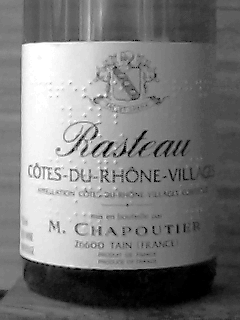
- 26 August 1998
- A Special Bottle
- A friend offered me a bottle of wine that was unusual in two respects. First, it cost over three dollars. Second, the label on the bottle had raised Braille letters.
And now I have an embarrassing confession to make. It's not about drinking cheap wine, everyone who knows anything about me knows I have no taste. I like eyes; mine are some of my favorite organs, so making jokes about blind people is even too distasteful for me. Having said that, here's my confession: all I could think about while drinking glass after glass was that Rasteau Côtes du Rhône Village is the wine to have if you ever want to get blind drunk. I felt horrible for thinking that, but now I don't feel quite so bad. Everyone I've told about the wine bottle with the Braille letters made some remark about being blind drunk. Nevertheless, I hope no blind person ever sees this confession. 
- 27 August 1998
- If I Can't Be Number One
- I try to avoid comparing my work with the things other people create for all the noble reasons any artist would cite. But on bad days, I must acknowledge that I am sometimes in awe of what other people put together.
Today is a bad day. I received a note from Mike Rozelski, an Eastern European immigrant who fell in love with a peculiar genre of contemporary music. As Mike puts it, "The only two musics I like are country and western." He sent me a list of his favorite titles: - Get Your Tongue Outta My Mouth, 'Cause I'm Kissing You Goodbye
- I Can't Get Over You, So Why Don't You Get Under Me?
- I Don't Know Whether To Kill Myself Or Go Bowling
- I Fell In a Pile of You and Got Love All Over Me
- I Flushed You from the Toilet of My Heart
- I Hate Every Bone in Your Body Except for Mine
- I Keep Forgettin' I Forgot About You
- I Still Miss You, Baby, But My Aim's Gettin' Better
- I'm So Miserable Without You, It's Like Having You Here
- If I Can't Be Number One in Your Life, Then Number Two On You
- If My Heart Had An Ass, I Would Kick It
- If You Don't Leave Me Alone, I'll Find Someone Else Who Will
- If You Leave Me, Can I Come Too?
- My Head Hurts, My Feet Stink, And I Don't Love Jesus
- My Wife Ran Off With My Best Friend, And I Sure Do Miss Him
- Now That I've Got Altzheimers (I Can't Remember You)
- She Got the Ring and I Got The Finger
- She Made Toothpicks from the Timber of My Heart
- Velcro Arms, Teflon Heart
- Why Don't We Get Drunk and Screw
- You Ain't Much Fun Since I Quit Drinking
- You Can't Have Your Kate and Edith Too
- You Done Tore Out My Heart and Stomped that Sucker Flat
- You Were Only a Splinter as I Slid Down the Banister of Life
- You're the Reason Our Kids Are So Ugly
I need to add a couple of disclaimers to this list. I don't agree with the violent and/or misogynist and/or otherwise offensive content of the above. All the above are purported to be the real titles of existing songs, so before I get more nasty letters from snarly lawyers, I acknowledge that the original authors retain the original copyrights blah blah blah ... And if disclaimer number one wasn't good enough, Then Number Two On You.  - 28 August 1998
- Schadenfreude City
- A few nights ago I watched a gangster movie that was so violent I had to walk away after a few minutes. In retrospect, though, brutal criminals seem rather benevolent when compared to contemporary litterary figures.
Eric Griffiths, a middle-aged professor at Trinity College, Cambridge, England, has been in the news recently for abusing eighteen-year old Tracy Playle during her interview at his school. The abuse wasn't sexual; that sort of teacher-student relationship is too common to be newsworthy. Instead, he bullied and insulted her (he asked if she'd ever heard of Adolph Hitler, mimicked her regional accent, wondered if she knew "those funny squiggles" were Greek, et cetera) until she cried. It was pretty standard behavior for a forty-five year old maladjusted child. From most accounts, Eric would appear to be a bully, a pathetic jerk whose only route to upward mobility seems to be putting others down. Paul Hamlyn's illustration of sneering Eric's head floating over a steaming pile of dog shit in today's Observer (UK) painted what may be a painfully accurate portrait of an aging prodigy. It wasn't always that way, of course. At one time, Eric was considered promising. Promising, as in Cyril Connolly's observation that "Whom the gods wish to destroy they first call promising." That was a long time ago. That was one book ago. One book is all that Eric's produced. Ever. For someone who prides himself on his litterary acumen, that has to be debilitating. At the age of forty-five, some people know they have their best work ahead of them; others know they're empty. Eric must know which side of the fence he's on. Eric's current creative output may be limited to insults. He described A.S. Byatt's book Possession as "the kind of novel I'd write if I didn't know I couldn't write novels." The professor knows he can't write novels. He can, though, bully other people until they cry, as he did with his nationally-televised remark about Byatt's work. Byatt, who knows she's on the other side of the creative divide from nasty Eric, may not have had enough Liberace tears to cry all the way to the bank. And no tears should be shed over Byatt's abuse at the hands of a reviewer; she can be even more cruel. Her recent review of Edward O. Wilson's Consillience ended with perhaps the most damning critique imaginable: "This is not his best book." Ow! That's going to hurt in the morning!  - 29 August 1998
- Perhaps Not the Best Policy
- I just received a nasty phone call from an irate curator whose show I reviewed rather unfavorably.
"Why did you call my exhibit 'unmitigated rubbish'?" she demanded. "Upon reflection, I suppose those words were inappropriate." I admitted. "Are you prepared to print an apology?" she asked in a slightly less hysterical tone. "I'm sorry, I meant that my review was uncharacteristically charitable." I don't think she took it very well. She screamed something about "the next time you don't get an invitation to an opening it will be from me" and slammed down the phone. So it goes. Fortunately, she's not the only game in town when it comes to free wine and cheese.  - 30 August 1998
- I'm Afraid I Can't Do That
- Douglass Rain, a Shakespearean actor from Ontario, Canada, is probably most famous for his role in the film 2001: A Space Odyssey, even though he never appeared in it. I read that Rain was the voice of HAL, the ship's insubordinate computer.
It must be horrible to be most closely associated with a mechanical voice after decades of perfecting soliloquies. I was tempted to verify the assertion that he refuses to discuss his HAL role by calling him on the phone to request an interview. I figure the worst that could happen would be that he'd say "I'm sorry, Dave, I'm afraid I can't do that." On second thought, I'll leave him alone. He's probably miserable enough without any help from me.  
- 31 August 1998
- Happy Deathday, Ad!
- I've been reading a lot about my distant relative Ad Reinhardt recently. What a great guy! To begin with, there are the brilliant quotes:
"Art is too serious to be taken seriously." "There is something wrong, irresponsible, and mindless about color, something impossible to control. Control and rationality are part of any morality." "I haven't done any cartoons or satires for a long time because it doesn't seem possible. The art world is no longer satirizable. I suppose there's not very much going on except business, and that's not very funny. Ten years or fifteen years ago (perhaps it was much longer), it was possible for one artist to call another artist an old whore. It's not possible any more. The whole art world is whorish and one artist couldn't possibly call another artist an old or young whore. Everyone now wants to be a 'howling success' and a celebrity." "I'm merely making the last painting which anyone can make." But Ad saves the best part for the end. Most biographies conclude with: "Dies in studio, 31 August" That's the way to go, kind of like a cowboy dying with his boots on. Happy deathday, Ad! 
last period | index | next period
©1998 David Glenn Rinehart
| |

